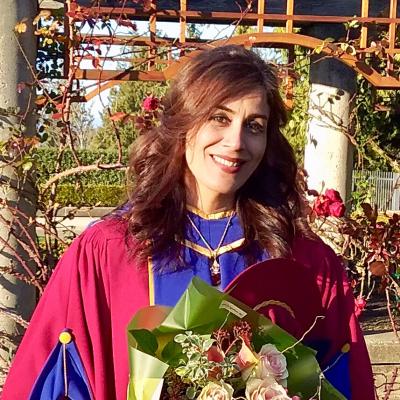Shekooh Behroozian is a 2021 Michael Smith Foundation for Health Research (MSFHR) scholar looking at the development of a non-invasive way to detect infections in patients with cystic fibrosis

Research topic
Research Description
My UBC postdoctoral research focus is majorly directed to bacterial pulmonary infections in cystic fibrosis (CF) patients. CF is known as the most common inherited, life-threatening, multi-organ disease among Canadian children and young adults, with primary morbidity dominated by persistent pulmonary infections. I particularly aim to characterize volatile organic compound (VOC) fingerprints of major bacterial pathogens causing persistent pulmonary infections in CF patients, which are also broadly relevant to pneumonia in children. Employing our discovery pipeline that samples the volatile molecules produced by clinical isolates in vitro as well as the breath samples of CF patients, we particularly aim to determine the volatile fingerprints of bacterial pathogens that can be used further as diagnostically-useful biomarker signatures. I also seek to investigate if correlations exist between volatile fingerprints and virulence determinants of those pathogens such as: antimicrobial resistance, biofilm formation, and mucoidy. The study will result in a shortlist of VOC biomarkers for further clinical validation for diagnostic purposes as well as monitoring antimicrobial therapy efficacy in CF patients and other children with this infection etiology.
Why did you decide to pursue a postdoctoral fellowship at UBC? Did you consider other opportunities?
The university of British Columbia has been my academic home since I moved to Canada. UBC supported well my PhD journey by offering vibrant research environment, fruitful resources, and nice collaborative spirits, especially with the presence of many leading figures in my field. Pre-Covid era, I was thinking to have a post-doctoral training somewhere else in Canada to bring back a diverse and resourceful experience to UBC, as my considered home institution, but pandemics, though negative by nature, highlighted exceptional opportunities at UBC for me. Joining Prof. Jane Hill team was one of them.
What specifically attracted you to your research group?
My pre-doctorate experience at Shiraz University of Medical Sciences created a patient-oriented mindset which has deeply and constantly inspired me with a special passion toward research for better therapeutics and faster diagnosis. After my PhD studies on the discovery of novel antimicrobial agents and small molecules, I was sure that I wanted to add more Omics -as one of the newest players in this field- and clinical applications to my further research. Late 2020, I noticed that Prof. Jane Hill, a great scientist in Volatilome, has moved to UBC in the Dep. of Chemical and Biological Engineering. Besides, I had had a very positive experience collaborating with Prof. John Grace in CHBE during my doctorate studies. These, together with the way Hill’s research aims to link microbial metabolome to non-invasive diagnostics attracted me to be part of Hill’s research team.
What advice do you have for new postdoctoral fellows?
Some pieces of advice I would offer are: First, believe in yourself and your scientific questions; write them down, pursue your ideas, and discuss them further. Second, while you are working hard on research topics, help yourself with time- and project-management trainings which will be super helpful in a long run. Third, while you are expanding your horizons of research-related skillsets and networking, take some time to explore and discover the beauties of UBC Point Grey campus. I am constantly marveled at having four beautiful seasons at UBC, framed artistically by ocean and forests. Regular walks even shortly, will add to your inspiration as well as boost up your health and spirit.
What do you like to do for fun?
I cherish my spare time with literature, poems, and Persian calligraphy. I also enjoy inviting colors to my life via photography and handicrafts. Being so connected to the nature, I have been continuously inspired with its spectacular representations of beauty, resilience, and flexibility. However, my special moments with endless enjoyment come when I pose a scientific question to my 15 y/o son which sparks a surprising discussion reflecting his scientific vision.
What is the most enjoyable aspect of your postdoctoral fellowship?
Exploring novel paths toward new discoveries for sure!
What are the biggest challenges you have faced, or anticipate facing, in your career?
The main challenge has been keeping the balance between my scientific research and responsibilities as a mom. While our enthusiasm toward answering research questions and our thirst for learning are endless, the early years of our parenthood and the impact we can have are irreplaceable.
What does receiving this award mean for your career?
This award is a huge honor and accomplishment for me. This can be a beginning of a more exciting and meaningful research career, opening new arena for pursuing research inquiries I am passionate about.
What do you think the next step in your career will be?
The next step in my career would be becoming a principal investigator in academia or a scientist in BC Health Research organizations